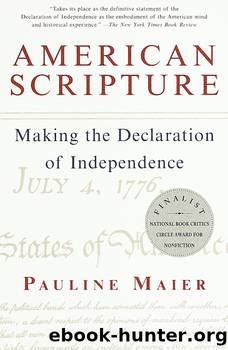American Scripture by Pauline Maier

Author:Pauline Maier [Maier, Pauline]
Language: eng
Format: epub
ISBN: 978-0-307-79195-5
Publisher: Knopf Doubleday Publishing Group
Published: 2012-02-15T00:00:00+00:00
CHAPTER IV
American Scripture
RESPONSIBILITY FOR DISTRIBUTING the Declaration of Independence fell to Congressâs president, John Hancock. He executed that job with none of the anxiety that had gripped him a year earlier, as he and Samuel Adams set out for the Second Continental Congress. Fear of division haunted him then, fear that the other colonies would blame Massachusetts for the outbreak of war and leave it to face the British alone. But in July 1776 Congress managed to agree unanimously on Independence, a far harder decision than any that preceded it.1 Britainâs persistent, wrongheaded policy provoked that unity, but it also rewarded months of strenuous political maneuvering within Congress and throughout the country. Now it was necessary to tell the American people that they had assumed a âseparate and equal stationâ among the âpowers of the earth,â and then, more difficult, to earn recognition of that status on the battlefield.
How the word went out is one story; what became of the Declaration afterward is another, more complex and of continuing significance. The Declaration was at first forgotten almost entirely, then recalled and celebrated by Jeffersonian Republicans, and later elevated into something akin to holy writ, which made it a prize worth capturing on behalf of one cause after another. The politics that attended its creation never entirely left its side, such that the Declaration of Independence, which became a powerful statement of national identity, has also been at the center of some of the most intense conflicts in American history, including that over slavery which threatened the nation itself. In the course of those controversies, the document assumed a function altogether different from that of 1776: it became not a justification of revolution, but a moral standard by which the day-to-day policies and practices of the nation could be judged.
The Declaration of Independence was in some ways the most unlikely of all documents to play such a role, one whose work was essentially done once it had successfully announced and justified Congressâs decision to break with Britain and begin a new nation. Moreover, its assertion that âall men are created equal,â which became a prominent part of the documentâs moral message, had originally referred to men in a state of nature, that is, before government existed. To accomplish so thorough a remaking of that eighteenth-century document went beyond the power of any one man. No less than its original creation, the redefinition of the Declaration was a collective work by Americans who struggled over several generations to establish policies consistent with the revolutionary heritage as they came to understand it in the only way open to themâthrough politics.
Download
This site does not store any files on its server. We only index and link to content provided by other sites. Please contact the content providers to delete copyright contents if any and email us, we'll remove relevant links or contents immediately.
| Americas | African Americans |
| Civil War | Colonial Period |
| Immigrants | Revolution & Founding |
| State & Local |
In Cold Blood by Truman Capote(2695)
Steve Jobs by Walter Isaacson(2445)
All the President's Men by Carl Bernstein & Bob Woodward(1967)
Lonely Planet New York City by Lonely Planet(1850)
The Murder of Marilyn Monroe by Jay Margolis(1748)
The Room Where It Happened by John Bolton;(1725)
The Poisoner's Handbook by Deborah Blum(1667)
And the Band Played On by Randy Shilts(1625)
Lincoln by David Herbert Donald(1618)
The Innovators by Walter Isaacson(1601)
The Innovators: How a Group of Hackers, Geniuses, and Geeks Created the Digital Revolution by Walter Isaacson(1512)
A Colony in a Nation by Chris Hayes(1512)
Under the Banner of Heaven: A Story of Violent Faith by Jon Krakauer(1420)
The Unsettlers by Mark Sundeen(1345)
Amelia Earhart by Doris L. Rich(1343)
Birdmen by Lawrence Goldstone(1343)
Decision Points by George W. Bush(1256)
Dirt by Bill Buford(1243)
Zeitoun by Dave Eggers(1229)
